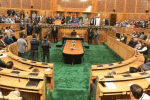In a deeply unsettling turn of events, the skies over Tel Aviv and Tehran have once again become battlefields in a conflict rapidly growing out of control.
In the early hours of Wednesday, Iran announced it had launched a barrage of hypersonic missiles at Tel Aviv—an escalation that sent shockwaves across the region. The missiles, part of Iran’s “Operation Honest Promise 3,” were reportedly Fattah-1 class, capable of traveling at more than five times the speed of sound and evading most missile defense systems.
The strike came just hours after former U.S. President Donald Trump called for Iran’s “unconditional surrender” and issued a chilling warning on his social media platform, claiming the U.S. had the capacity to assassinate Iran’s Supreme Leader—but wouldn’t act on it “for now.”
Meanwhile, Israel responded forcefully, launching airstrikes deep into Tehran, including on alleged weapons manufacturing facilities and a plant used to produce centrifuges. Israeli officials claimed the strikes were aimed at preventing Iran from advancing any nuclear ambitions—a charge Iran has repeatedly denied.
As the conflict enters its sixth day, both nations continue to trade deadly blows. Civilians, caught in the middle, are fleeing in fear. Tehran streets saw panicked residents queueing at bakeries and fuel stations, while many in Tel Aviv have taken refuge in underground shelters.
A cyberattack further added to Iran’s chaos, crippling Sepah Bank, one of the country’s largest state-run institutions.
International concerns are growing. Egypt has urged diplomatic talks, while world leaders scramble to find a peaceful resolution. Trump, who cut short his G7 summit appearance, ordered U.S. military reinforcements to the region, but officials stress that no decision has been made about direct intervention.
Foreign nationals are being evacuated. Over 700 people from countries including Germany, China, the U.S., and several Central Asian republics have fled Iran. The U.S. has shuttered its embassy in Jerusalem until Friday as a precaution.
In one poignant moment, 30-year-old Tel Aviv resident Mali Papirany, now living in an underground parking lot with others, said simply: “We’ve decided to permanently set camp here until it’s all clear, I guess.”
The emotional toll is mounting. Iran claims over 224 of its people—scientists, military commanders, and civilians—have died. Israel reports at least 24 deaths, with hundreds injured.
And yet, diplomacy remains elusive. Nuclear negotiations between Iran and the U.S. have been suspended indefinitely. As President Macron of France warns of potential chaos from regime change efforts, China accuses Trump of “pouring oil on the fire,” and Turkey labels Netanyahu a regional threat.
The region stands on the edge. The world watches, hoping reason will rise before humanity falls deeper into a conflict with no winners.








